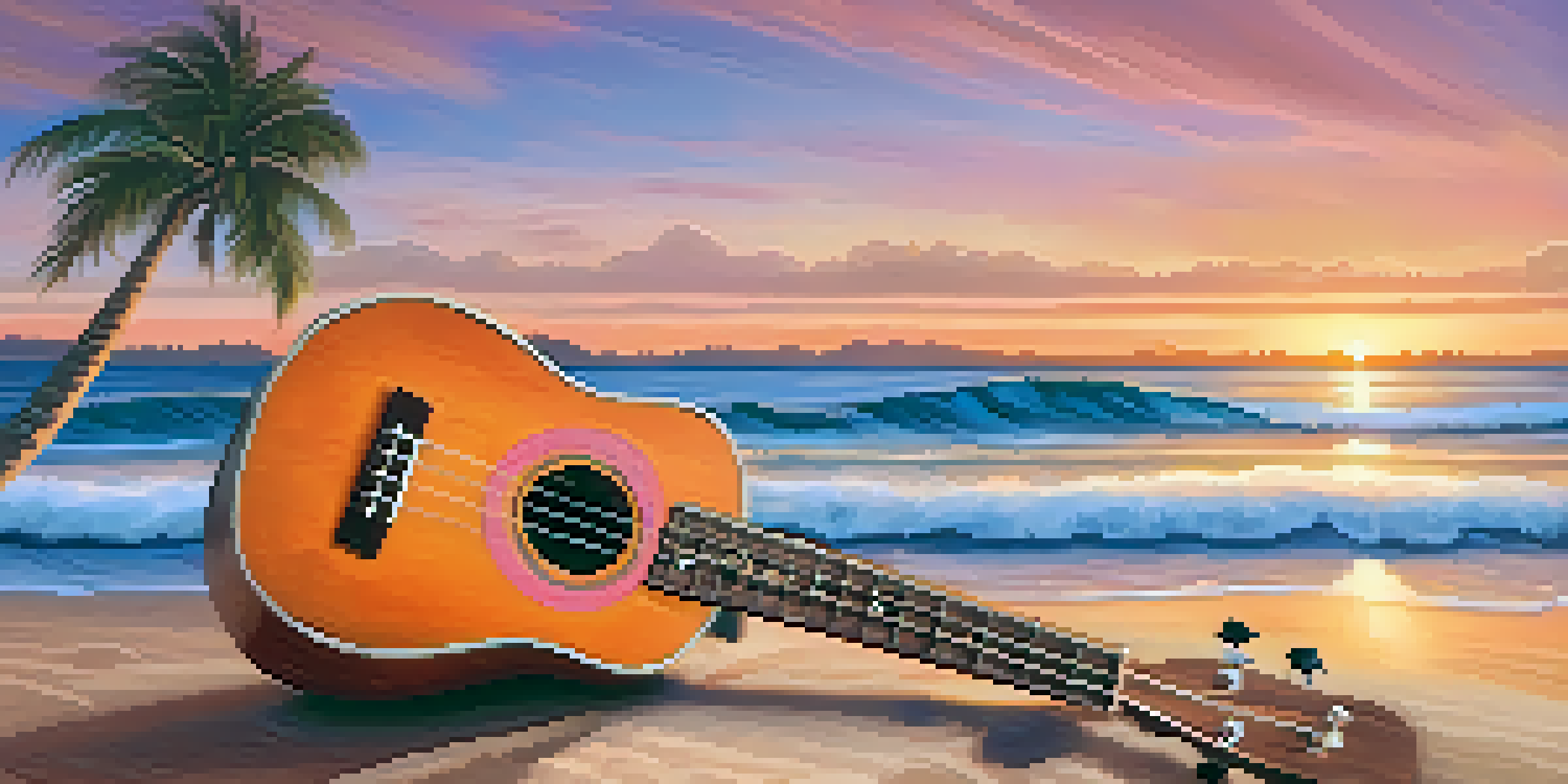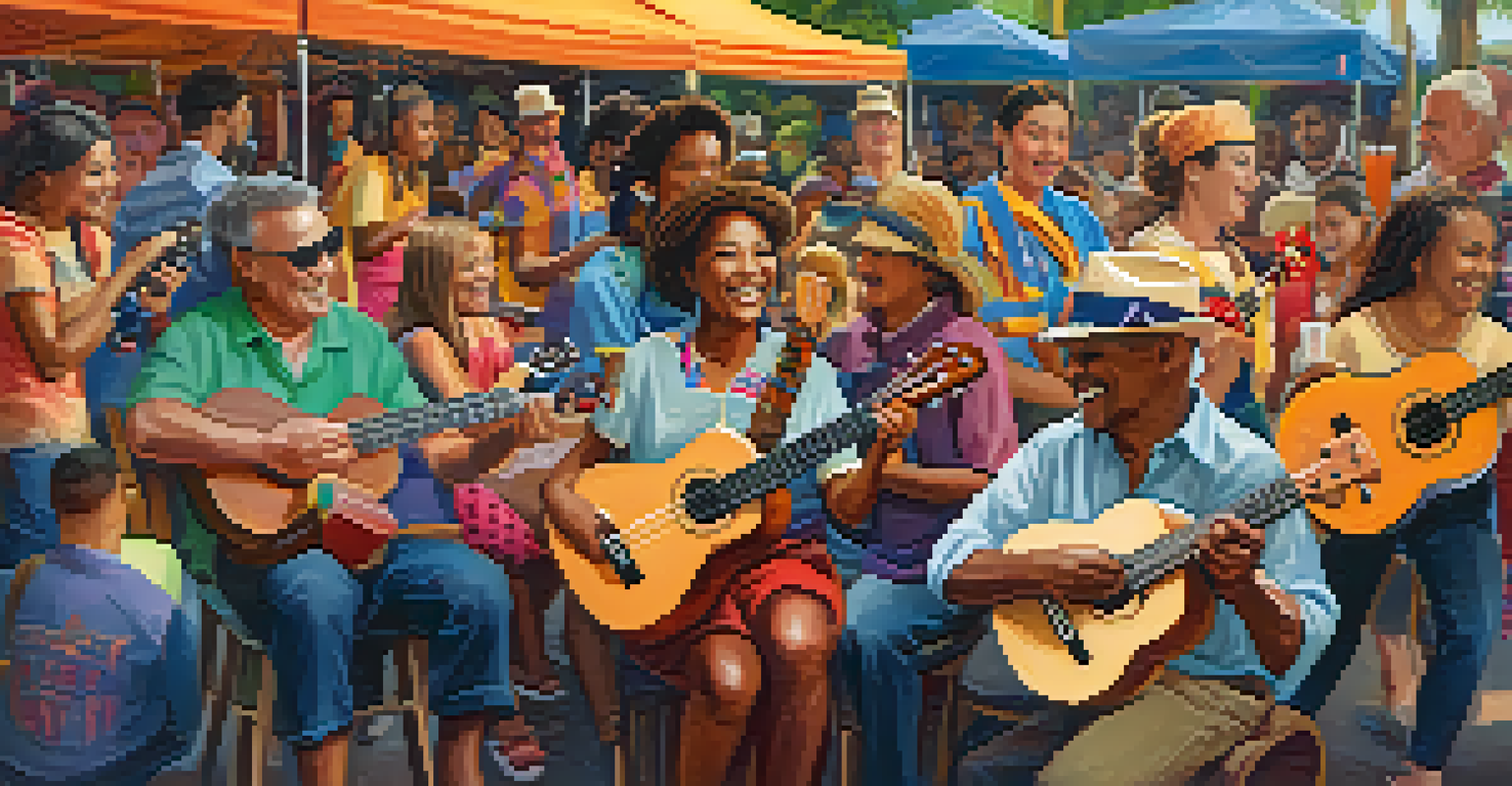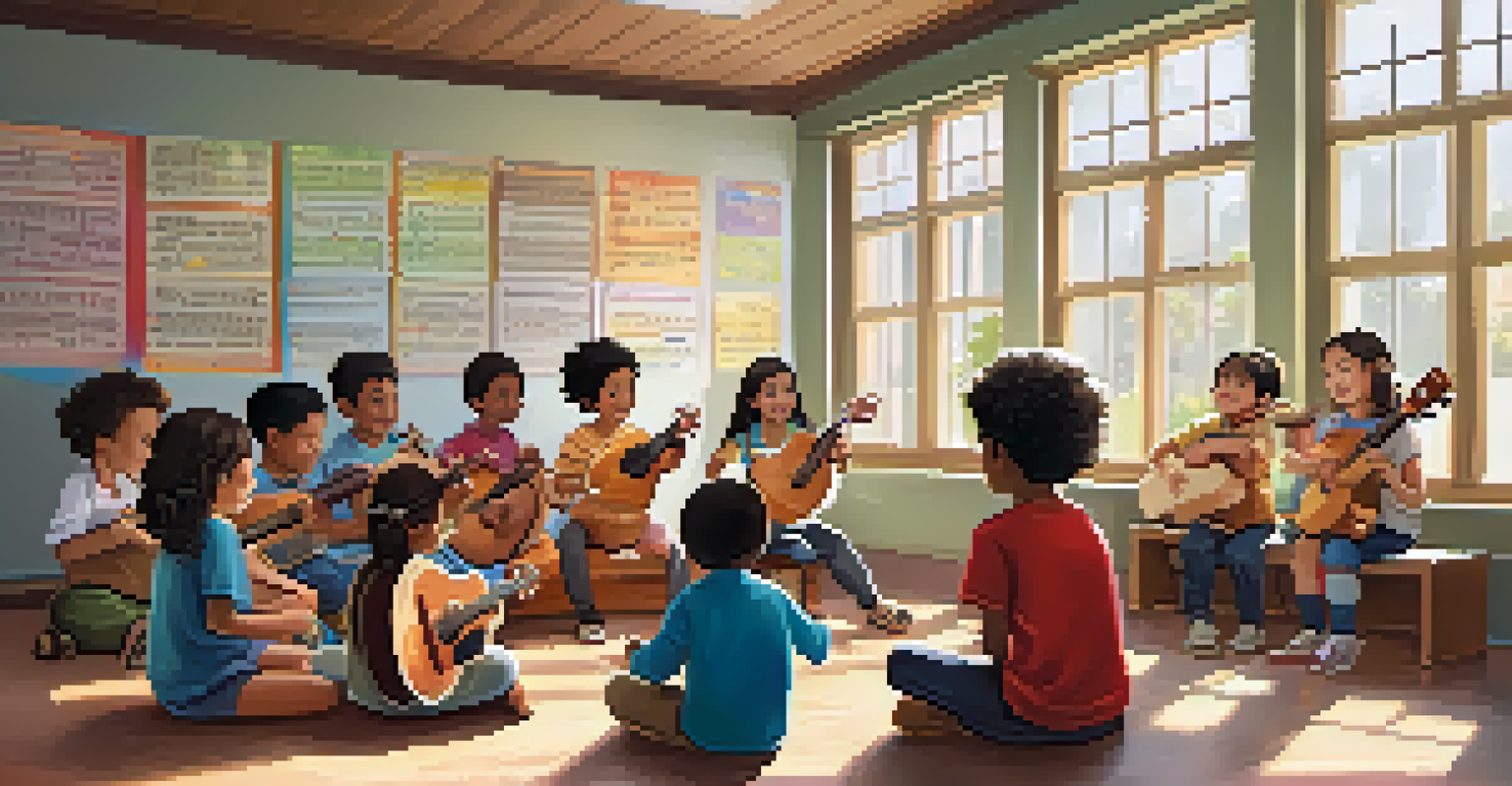The Ukulele's Journey: From Hawaii to the Global Stage

Hawaiian Origins: The Birth of the Ukulele
The ukulele, often associated with the sunny beaches of Hawaii, has roots that trace back to the late 19th century. It was inspired by similar instruments brought by Portuguese immigrants, particularly the machete. These newcomers introduced their musical traditions, which blended seamlessly with Hawaiian culture, giving birth to the ukulele as we know it today.
The ukulele is a bridge between cultures, uniting people through the universal language of music.
The name 'ukulele' itself means 'jumping flea' in Hawaiian, a nod to the lively finger movements of players. As it gained popularity, the instrument became a staple in Hawaiian music, celebrated for its cheerful sound and portability. It quickly became a symbol of the Hawaiian spirit, often featured in local gatherings and celebrations.
By the early 20th century, the ukulele was not just a local sensation but a beloved instrument among tourists who visited the islands. Its charming sound and easy playability made it an attractive choice for those wanting to capture the essence of Hawaii, paving the way for its future global journey.
The Ukulele's Rise in Popularity in the Early 20th Century
The ukulele's journey from Hawaii to the mainland U.S. accelerated during the 1900s. The arrival of vaudeville acts and early radio shows brought the instrument into the spotlight, with performers showcasing its delightful sound. This exposure ignited a love for the ukulele among American audiences, who were eager to embrace the exotic melodies.

In the 1910s and 1920s, the ukulele became a fixture in American music, featuring prominently in jazz and popular tunes. Iconic figures like Cliff Edwards, known as 'Ukulele Ike,' captivated audiences with their performances, further solidifying the instrument's place in mainstream music. Its catchy tunes and lighthearted nature resonated with listeners, creating an enduring cultural impact.
Ukulele's Rich Cultural Origins
The ukulele originated in Hawaii, influenced by Portuguese instruments, symbolizing the joyful spirit of Hawaiian music.
By the time the Great Depression hit, the ukulele provided a much-needed escape for many, offering joy through music when times were tough. Its affordability and accessibility meant that anyone could pick it up and play, leading to a surge in sales and a growing community of enthusiasts.
The Ukulele in the Mid-20th Century: A Cultural Shift
As the mid-20th century approached, the ukulele faced stiff competition from other musical genres and instruments. Rock and roll took center stage, and the ukulele seemed to fade into the background. However, its loyal fans continued to cherish the instrument, ensuring it remained a beloved part of music education and casual play.
Music can change the world because it can change people.
During this time, the ukulele found a new audience through folk music movements in the 1960s. Artists like Pete Seeger and The Kingston Trio began incorporating the ukulele into their performances, reviving interest and introducing it to a new generation. This resurgence was significant, as it showcased the instrument's versatility beyond Hawaiian music.
The 1970s and 1980s saw the ukulele slowly re-entering popular culture, with more artists experimenting with its sound. Its playful nature made it a perfect fit for children’s music and educational settings, solidifying its role in music classrooms across the country.
The Modern Ukulele Revival: A Global Phenomenon
Fast forward to the early 21st century, and the ukulele is experiencing a remarkable revival. Thanks to the internet and social media, players from all corners of the globe are sharing their love for this charming instrument. Platforms like YouTube have given rise to countless tutorials and performances, making the ukulele more accessible than ever.
This modern revival is not just limited to casual players; professional musicians have embraced the ukulele as well. Artists like Jake Shimabukuro and Eddie Vedder have showcased the instrument in innovative ways, blending genres and pushing creative boundaries. Their influence has inspired a wave of new players who are eager to explore its possibilities.
A Modern Global Revival
In the 21st century, the ukulele has seen a resurgence in popularity, fueled by social media and global festivals.
Moreover, ukulele festivals and gatherings have sprung up worldwide, celebrating the instrument's rich history and diverse community. These events create a sense of belonging among enthusiasts, reinforcing the idea that the ukulele is not just an instrument but a bridge that connects people through music.
The Ukulele's Role in Music Education
The ukulele has become a staple in music education, and for good reason. Its size, affordability, and relative ease of play make it an ideal instrument for beginners. Many schools have adopted the ukulele as part of their curriculum, fostering a love for music in children from a young age.
Teachers appreciate that the ukulele allows students to experience the joy of making music without overwhelming them with complex techniques. The instrument's simple chord structures enable quick learning and immediate gratification, encouraging students to practice and progress. As a result, classrooms are filled with the cheerful sounds of ukuleles, creating a positive learning environment.
Beyond the classroom, community centers and after-school programs have also embraced the ukulele. Workshops and clubs provide opportunities for students to collaborate, perform, and learn from one another. This not only nurtures musical skills but also builds confidence and fosters friendships among young musicians.
Cultural Significance: The Ukulele Beyond Music
The ukulele's impact extends far beyond music; it has become a cultural symbol in various communities. In Hawaii, it represents a connection to the islands' history and traditions, serving as a reminder of the rich heritage that has shaped its sound. Local musicians often use the ukulele to tell stories and preserve the cultural narratives of their ancestors.
Globally, the ukulele has transcended cultural boundaries, becoming a tool for unity and expression. People from different backgrounds and walks of life have embraced the instrument, using it to convey emotions and share experiences. This inclusivity is part of what makes the ukulele so special; it invites everyone to join in and create music together.
Impact on Music Education
The ukulele is widely embraced in music education due to its accessibility and ability to foster musical enjoyment among beginners.
As the ukulele continues to evolve, it remains a powerful reminder of music's ability to connect us all. From casual strumming on a beach to grand performances on international stages, the ukulele's journey reflects the diverse tapestry of human experience, celebrating both individuality and community.
The Future of the Ukulele: Trends and Innovations
Looking ahead, the future of the ukulele appears bright and full of potential. As technology advances, new materials and designs are emerging, offering players even more options for sound and playability. Innovations like electric ukuleles and hybrid models are expanding the instrument's versatility, appealing to a broader range of musicians.
Additionally, the rise of online learning platforms is transforming how people approach playing the ukulele. With an abundance of resources available, aspiring musicians can learn at their own pace, opening the door for creativity and self-expression. This democratization of music education allows for a diverse array of voices to emerge in the ukulele community.

As the ukulele continues to capture hearts around the world, it will undoubtedly inspire future generations. Whether through traditional Hawaiian melodies or contemporary pop tunes, the ukulele's journey is far from over, and its evolution will likely lead to exciting new developments in the years to come.